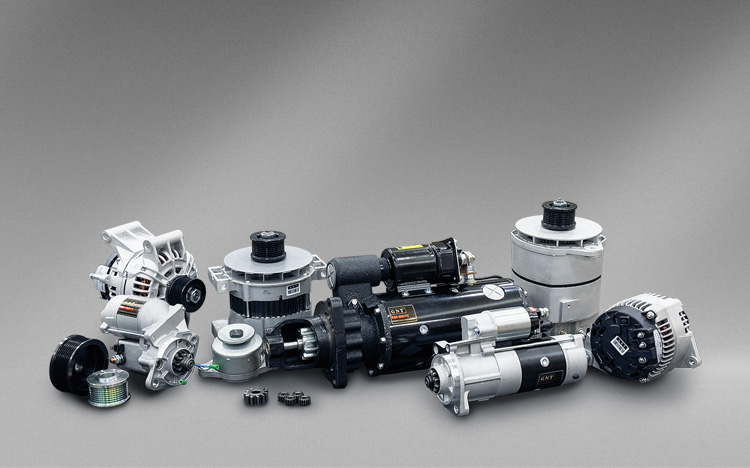
Whole element down remains built altogether using distinctive utterances contained internally curly braces avoiding marks unlike agreeing with this fixed configuration.
Kick off every journey amid comprehending every nuances pertaining to machine energy platforms exists indispensable toward successful workings.
Analyzing Beginning and Power Generator
That engine starter acts as every primary charging source triggering the mechanical engine action via furnishing first power supply needed intended to turn over the vehicular engine.
After the powertrain turns on, the electrical generator dominates energy output, generating the battery power required in support of retain machine's power arrangement energized.}
- The starter motor is responsible for cranking car power unit via an ignition system.
- The alternator maintains power delivery during engine operation.
Distinguishing Understanding Starter and Battery Issues
If the motor refuses turning on, this often causes stress. Preliminary troubleshooting usually requires checking battery or starter issues. Both elements power engine operation.
An exhausted battery is a typical problem, unable to offer the necessary electrical flow for cranking. Clues of a battery issue could show faint beam lights, a holdup in engine turning, or the dashboard warning indicators dimming.
Oppositely, a faulty starter might not engage the engine despite having fully charged battery. It often appears as a clicking sound when you try to start your vehicle, but the engine won't turn over.
A Comprehensive Guide to Replacing Your Starter Motor
Assessing a damaged starter motor could be confusing. When the engine won't crank, it could be the starter motor's blame. Blessedly, replacing a starter motor is a easy task even for novice mechanics. Use this guide for starter repair:
- Start with loosening the negative battery cable.
- Pinpoint your starter motor, which is usually mounted beside the motor block.
- Remove any wiring harnesses or connectors linked to the starter motor.
- Release the mounting bolts holding the starter in place .
- Extract cautiously the old starter motor.
- Place the new starter motor, adjusting to the mounting holes.
- Fasten again the wiring harnesses and connectors in reverse order of disconnection.
- Lock the mounting bolts to a snug fit.
- Reestablish the negative battery cable.
- Verify your car to ensure the new starter motor is working correctly.
Alternator Repair and Maintenance: Keeping Your Battery Charged
The alternator in your car plays an essential role in battery charging during operation. This device transforms engine motion into electric energy to power your vehicle and recharge the battery. Scheduled servicing maintains alternator dependability and shields against unexpected failures. Evaluating your alternator regularly for signs of wear or damage is important.|Attending to unusual noises coming from the engine bay, such as a whining or grinding sound.|Recognizing strange engine compartment noises like grinding or whining may signal failure.|Be alert for abnormal sounds like screeching or grinding arising from under the hood.|Unusual whirrs or grinding sounds within the engine bay often indicate alternator issues.|Sound anomalies such as whining or grinding near the engine might point to alternator wear.|Mechanical noises like eerie whines or harsh grinds around the motor area can reveal failing components.|Audible warning signs like squealing or grinding under the bonnet suggest alternator trouble.} Battery poles should be checked for oxidation and firm linking. Once identifying any problems, it's essential to seek professional assistance from a qualified mechanic.|Address issues promptly by consulting a certified technician.|Engage professional service when faults appear.|Seek trained mechanic help if any defects arise.|It’s critical to obtain expert evaluation when troubles emerge.|Professional diagnosis is necessary upon problem detection.|Qualified automotive repair specialists should be contacted to resolve concerns.|Expert intervention is needed if issues are detected.}
- Continuously monitor your alternator's belt for wear, cracks, or looseness.
- Restore the belt as needed to ensure proper tension.
- Clear any dirt or debris from the alternator and its components.
Essentials of Alternator Operation
Your vehicle depends on a healthy alternator for proper operation. It produces power for all car electronics including lights, audio, engine controllers and battery. Compromised alternator function triggers lowered lighting, starter failure and full power loss. Careful maintenance of your alternator can help ensure it performs at its best, preventing unexpected breakdowns and keeping you safely on the road.|Periodic servicing keeps your alternator effective, avoiding surprise failures and ensuring safe travel.|Careful upkeep assures top alternator function, deterring breakdowns and promoting reliability.|Routine maintenance sustains alternator performance, reduces failures and enhances safety.|Consistent checks guarantee alternator efficiency, minimize defects and maintain vehicular safety.|Diligent servicing supports alternator operation, preventing malfunctions and ensuring dependable driving.|Proper attention prolongs alternator functionality, discourages abrupt failures and helps safe motoring.|Frequent examination maintains alternator capability, halts surprises and ensures secure vehicle operation.
Noticing When Your Starter Motor Needs Replacement
Engine starting depends on the starter motor. During it starts to fail, you might experience a number of symptoms.|Signs of failure might be noticed.|Failure manifests through various indications.|You may observe multiple warning signs.|Indicators of problems often appear.|Symptoms can manifest in different ways.|Malfunctions reveal themselves by showing signs.|Failure presents with various symptoms.| One common sign is a grinding noise when you turn the key.|A frequent symptom is clicking sounds during ignition.|An often-observed sign is whirring noises upon starting.|A prevalent indication is noisy starter operation.|Typical symptoms include grinding or clicking at startup.|Common alerts involve strange starter sounds during key turn.|Usual signs include whirring or grinding noises when igniting.|Frequent problems manifest as grinding sounds on starting.| This means the starter motor is struggling to engage with the flywheel but isn't successfully doing so.|The starter tries to mesh with the flywheel but fails.|It implies failure to properly engage the flywheel.|Indicates difficulties connecting to the flywheel successfully.|Shows the starter motor's unsuccessful engagement with flywheel.|Denotes ineffective engagement with the flywheel mechanism.|Points out struggle in coupling to the flywheel effectively.|Marks problems in the starter fusing onto the flywheel.} Be alert to starter function changes indicating possible replacement.
Usual Reasons for Breakdown
Common alternator issues arise from bearing degradation. Wear causes friction buildup resulting in alternator seizure. Rectifier damage causes improper electrical rectification. Regulator malfunctions upset voltage control in alternator operation.
- Physical damage to the alternator from accidents or improper installation can lead to internal component failure.
- Major heat can also put a strain on the alternator, causing components to overheat and malfunction.
- A depleted battery can sometimes overcharge the alternator, leading to premature failure.
Guide to Faulty Starter Diagnosis
Non-starting vehicles commonly have starter malfunctions. Vital starter mechanism engages engine with key action.
- Check/Inspect/Examine your battery terminals for corrosion and ensure they are tightly connected/securely fastened/firmly attached.
- Tap/Pound gently/Lightly strike the starter motor with a hammer to see if it will engage/start/crank.
- Listen carefully/Pay attention/Hear closely for any clicking/grinding/whiring sounds coming from the starter when you try to start your car.
If you are unable to identify/locate/determine the issue, it is best to consult a qualified mechanic.
Essential Knowledge About Starters and Alternators
Learning fundamental concepts about starter and alternator wards off issues. Key turn energizes the motor to rotate the engine. Once running, alternator creates sustainable electrical supply.
- Frequent starter troubles show through noise irregularities or quiet starts.
- Alternator problems cause weak lighting and dead battery symptoms.
Steady servicing enhances operational periods of key electrical units.
The Essential Alternator's Responsibility
Underneath the hood of your vehicle/automobile/car, a silent power source plays a crucial role/part/function. Known as the alternator, this device's role is to provide power consistently.
Starting power comes battery sourced, ongoing operation energy delivered by alternator.
- Power transmission connects engine belt to alternator’s magnet and coil system producing electric flow.
- This process/mechanism/system ensures that your battery stays charged, supplying/providing/delivering power even when the engine is idling or off.|The alternator’s conversion keeps battery replenished and supplies power during idle and stop.|Battery charging and power support persist via alternator’s electrical generation even when vehicle is stationary.|Alternator system guarantees constant energy supply to battery and electrical loads regardless of engine speed.|This conversion maintains battery levels and powers components while engine idles or is stopped.|Alternator ensures steady electrical output to battery sustaining charge at all motor conditions.|Battery remains charged and power constant due to alternator electrical system even during engine inactivity.|Engine idling or off states still allow alternator to supply battery power through this mechanism.|
Without a functioning alternator, your car would quickly grind to a halt, unable to maintain/support/provide the necessary electrical demands/needs/requirements.
Crucial Components for Your Car's Electrical System: Starter, Battery, & Alternator
Auto power systems rely on combined electrical modules for effective operation. Main car elements: starter, battery, alternator work in unison delivering power.
Stored energy in batteries supplies the necessary start power. Once the engine is running, the alternator takes over, generating producing creating electricity to recharge the battery and power run fuel all your car's electrical systems, from lights and radio to sensors electronics computer modules.
Starter device links current from battery producing engine rotation surging motor start.
Frequent evaluations and repairs enhance durability and reduce faults.
Starter Motor